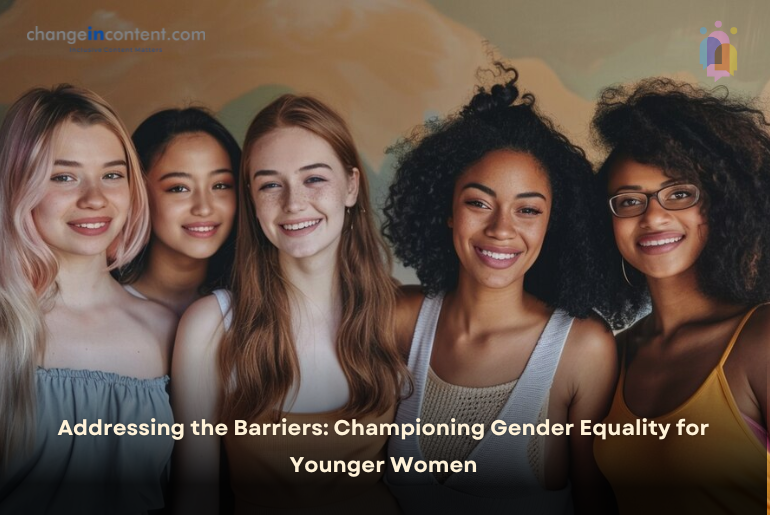For decades, the belief that social progress is inevitable has shaped how we think about gender equality. It is comforting to assume that each generation will do better than the last. However, the harsh reality reveals otherwise, especially when it comes to gender equality for younger women. Research, including findings from Harvard Business Review’s recent article on women in the workplace, highlights stagnation and even regression in key areas like career progression, workplace harassment, and ageism. It is clear that deliberate action, not just time, is required to move the needle forward.
Stalled progress: A wake-up call for gender equality for younger women
Younger women face challenges as soon as they step into the workforce. Despite making up 59% of bachelor’s degree holders, women account for only 48% of entry-level employees. From the start, they face underrepresentation and encounter the “broken rung”—the first critical promotion to manager. The gender gap in this area has seen negligible improvement, with 81 women promoted for every 100 men in 2023, a mere two-person increase since 2018.
This barrier stifles their upward mobility and sets the tone for a career rife with inequities. Fixing this requires companies to evaluate hiring and promotion practices. Moreover, companies must ensure they don’t perpetuate bias or penalise women’s ambitions.
Persistent sexual harassment: An unresolved issue
Despite movements like #MeToo, sexual harassment remains alarmingly prevalent. Research shows that one-third of younger women report experiencing sexual harassment at work, a figure unchanged from previous generations. This statistic is particularly troubling given that younger women have shorter tenures in the workforce, making the rate of incidents disproportionately high.
Organisations must actively create safer work environments by establishing clear anti-harassment policies. Moreover, they must ensure enforcement and promote a culture where reporting is met with accountability—not retaliation.
Work-life balance: The same struggle, new faces
Housework and childcare: A generational stalemate
For younger women in partnerships, little has changed regarding household responsibilities. Like their older counterparts, over one-third continue to shoulder most or all housework and childcare duties. The societal expectation that women should prioritise family over career persists, reinforcing structural barriers to their professional growth.
Youngism and gender bias
Younger women are also disproportionately affected by ageism—ironically termed “youngism.” Nearly 50% of younger women report that their age has had a negative impact on their careers. Gender bias compounds this issue as the idea of younger women often face dismissal or are undervalued. Addressing this requires establishing inclusive cultures where we measure contributions by merit, not age or gender.
Apathy from younger men: An alarming trend
Perhaps one of the most disappointing findings is that younger men are the least committed to gender equity, with their prioritisation of diversity declining over the years. This apathy underscores the need to engage all genders in equity initiatives actively. Moreover, we must ensure that the responsibility to drive change doesn’t fall solely on women.
Actionable steps toward gender equality for younger women
Achieving gender parity demands intentional, ongoing efforts. Here’s how organisations can champion gender equality for younger women:
Monitor representation
Companies must assess gender representation at every level, starting from entry-level roles. Understanding where women face underrepresentation helps identify bottlenecks and areas for intervention.
Repair the broken rung
Implement fair evaluation and promotion processes to address the barriers holding women back. Track promotion rates by gender and use metrics to ensure equitable career progression.
Create safe workplaces
Establish clear anti-harassment policies and foster a culture where women feel safe reporting incidents. Provide training to ensure accountability at all levels.
Tackle youngism and bias
Broaden ageism conversations to include younger women, addressing the microaggressions they face. Promote their ideas and contributions to prevent dismissal based on age or gender.
Engage all employees
Encourage younger men to participate actively in equity initiatives. Companies can implement awareness programs to highlight the value of diversity and the role men play in achieving it.
The final thoughts: Rolling up our sleeves for real change
The stagnation in gender equality for younger women should serve as a wake-up call for all of us. As various studies remind us, progress is not inevitable—it is the result of deliberate and sustained efforts. If we want to ensure that the next generation of women leaders thrives, we must take bold steps today.
At ChangeinContent, we believe the journey toward equity begins with recognition and action. Let’s work together to create workplaces where younger women can thrive, not just survive.
Disclaimer: The views expressed in this article are based on the writer’s insights, supported by data and resources available both online and offline, as applicable. Changeincontent.com is committed to promoting inclusivity across all forms of content, which we define broadly to include media, policies, law, and history—encompassing all elements that influence the lives of women and gender-queer individuals. Our goal is to promote understanding and advocate for comprehensive inclusivity.


